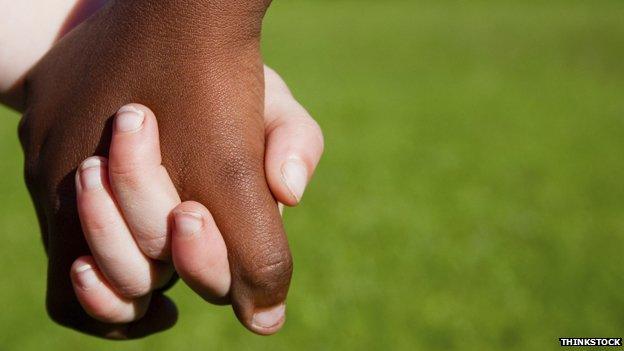Is Britain really becoming more racist?
- Published
- comments

Journalists like their stories to fit into an accepted current narrative. With domestic politics dominated by concerns over Europe and immigration, and the rise of the far-right elsewhere in the EU, it is understandable that editors are alert to evidence of rising racism in Britain.
But today's figures are not evidence of rising racism. In fact, if anything, the trend is of flat or declining levels of self-reported racial prejudice.
The statistics come from the annual British Social Attitudes survey which, since 1983, has interviewed one or two thousand people and asked if they are "very prejudiced", "a little bit prejudiced" or "not prejudiced at all" against people of other races.
Adding together the "very" (3%) and "a little" (27%) figures from this year's survey produces a total of 30% - up from last year (26%) but well below the year before (38%).
Yes, the current figure is higher than the lowest figures ever recorded (25% in 2000 and 2001) but then you could equally argue it is well below the high point of 38% recorded in 1987 and 2011.
What is most informative is the broad trend in self-reported racial prejudice. Falling from the 1980s until the end of the century, then rising during the first decade of the new millennium, and now flat or falling.
To be honest, we need a few more years of data before we can tell whether that fall is real or not. But to suggest that the latest figures represent a return to the racism levels of the 80s is clearly premature.
There is another difficulty with this data - it is a self-reported measure. We cannot be sure what people mean when they agree they are "a little bit prejudiced against people of other races". Could it be that the phrase today has as much to do with anxiety about the arrival of East European migrants as a belief that those from a different racial group are inferior?
The rise in self-reported prejudice during the noughties coincides with years of mass immigration, much of it made up of white Europeans. The figures may reflect concern about the impact of that as much as a true measure of racism.
Police figures of reported racist incidents are not a perfect proxy for racism levels either, but they provide further evidence that the trend is down or flat. Today's survey suggests younger people are significantly less likely to say they are prejudiced than their parents' generation. The trend among 17-34 year-olds is down while the trend among the over-55s is up.
The survey identifies some stark differences in self-reported prejudice - 19% among graduates but 38% among those without qualifications, 26% among professionals and managers but 41% among unskilled manual workers, 16% in booming inner London and 35% in the more economically sluggish West Midlands.
The key here, perhaps, is people's response to the cultural and economic impact of globalisation - attitudes towards foreigners will depend on whether one sees it as an opportunity or a threat.